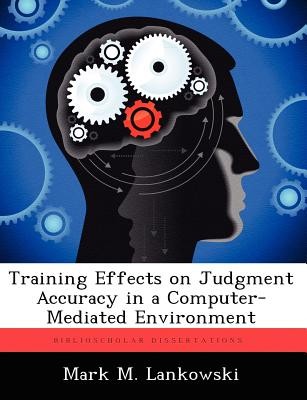
- We will send in 10–14 business days.
- Author: Mark M Lankowski
- Publisher: BiblioScholar
- ISBN-10: 1249586402
- ISBN-13: 9781249586401
- Format: 18.9 x 24.6 x 0.5 cm, softcover
- Language: English
- SAVE -10% with code: EXTRA
Training Effects on Judgment Accuracy in a Computer-Mediated Environment (e-book) (used book) | bookbook.eu
Reviews
Description
The United States Air Force (AF) has named Information Superiority the core competency "upon which all the other core competencies rely". In order to achieve Information Superiority, deceptive communication must be minimized. According to researchers, deception occurs when communicators control the information contained in their messages to convey a meaning that departs from the truth. This research draws on Biros, George, and Zmuds' (2002) deception research model to determine if training to detect deception will improve a person's deception detection performance in a computermediated environment. A longitudinal experiment was conducted with AF participants (N=119) where three separate training plans were provided as the treatments, and measurements of the participants' deception detection performance were taken before and after each of the three treatments. Each measurement was taken in the form of six judgment scenarios provided through three forms of computer-mediated communication. Partial support was found for training improving deception detection performance and reducing the number of false alarms in a computer-mediated environment, based upon the first training treatment and a combination of the first and second training treatments. However, contradictory results came from the second and third training treatments. The most significant finding was that the performance of AF participants attempting to detect deception in a computer-mediated environment could be improved by a training session. Further research should explore the best training methods to improve the deception detection performance of all AF members in order to achieve the goal of Information Superiority.
EXTRA 10 % discount with code: EXTRA
The promotion ends in 19d.05:56:51
The discount code is valid when purchasing from 10 €. Discounts do not stack.
- Author: Mark M Lankowski
- Publisher: BiblioScholar
- ISBN-10: 1249586402
- ISBN-13: 9781249586401
- Format: 18.9 x 24.6 x 0.5 cm, softcover
- Language: English English
The United States Air Force (AF) has named Information Superiority the core competency "upon which all the other core competencies rely". In order to achieve Information Superiority, deceptive communication must be minimized. According to researchers, deception occurs when communicators control the information contained in their messages to convey a meaning that departs from the truth. This research draws on Biros, George, and Zmuds' (2002) deception research model to determine if training to detect deception will improve a person's deception detection performance in a computermediated environment. A longitudinal experiment was conducted with AF participants (N=119) where three separate training plans were provided as the treatments, and measurements of the participants' deception detection performance were taken before and after each of the three treatments. Each measurement was taken in the form of six judgment scenarios provided through three forms of computer-mediated communication. Partial support was found for training improving deception detection performance and reducing the number of false alarms in a computer-mediated environment, based upon the first training treatment and a combination of the first and second training treatments. However, contradictory results came from the second and third training treatments. The most significant finding was that the performance of AF participants attempting to detect deception in a computer-mediated environment could be improved by a training session. Further research should explore the best training methods to improve the deception detection performance of all AF members in order to achieve the goal of Information Superiority.


Reviews